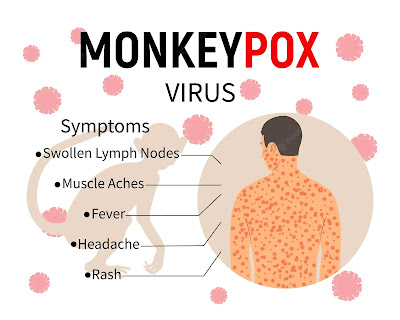A blog post about monkeypox provides information for potential sufferers and the dangers of contracting it. Learn everything from what Monkeypox is, what the symptoms are, and how to prevent or cure it.
What is Monkeypox?

Monkeypox is a viral disease that primarily affects Central and South American macaques. It is a member of the family of viruses that cause herpes viruses, which include chickenpox, human papillomavirus (HPV) infections, and shingles.
Monkeypox infection most often results in skin rashes, fever, headache, and swollen lymph nodes. In rare cases, the virus can spread to other parts of the body (such as the lungs), leading to death. There is no specific treatment for monkeypox, but supportive care including antibiotics may help manage symptoms. There is no vaccine available for monkeypox and no effective treatment if it spreads to other parts of the body.
Symptoms Of Monkeypox

Monkeypox is a viral disease that primarily affects primates, such as monkeys and apes. Symptoms can include fever, body aches and fatigue, rash, lymph node swelling, difficulty breathing, and eventually pneumonia and death. It is most common in immunocompromised people who are living in Africa or the Caribbean.

Symptoms may include fever, a rash all over the trunk and extremities, muscle aches and weakness, cough,, shortness of breath,, diarrhea,, headache,, and fatigue. In severe cases, Monkeypox can lead to encephalitis or even death.
There is no specific treatment for monkeypox and it is generally fatal. However, there is currently a vaccine available that may help prevent the disease from affecting susceptible people.
How Monkeypox Virus Spreads

Monkeypox is a viral disease that mainly affects monkeys, but can also affect humans. It is caused by the monkeypox virus, which is a member of the paramyxovirus family. Monkeypox spreads through contact with respiratory secretions, such as saliva or mucus, from an infected person.

The virus can also be spread through close contact with an exposed area on the body of an infected person, such as the face, chest, or hands. Monkeypox symptoms typically begin one to two weeks after exposure and generally last six to eight weeks.

How to Get Tested
If you are worried about whether or not you have been exposed to monkeypox, you should visit your doctor. Depending on the circumstances under which you were exposed – such as whether you traveled to an area where monkeypox is common – your doctor may ask for a series of tests to determine if you have contracted the virus.

These tests may include a blood test to look for antibodies that indicate previous exposure to monkeypox and a flu test to see if you are currently infected with any other viruses. If your tests come back positive for monkeypox infection, you have to start treatment immediately and take antibiotics as prescribed by your physician.
Treatment and Prevention
Monkeypox is an infectious disease that primarily affects primates, including humans. The disease can be easily treated with antibiotics if caught early, but it can be fatal in some cases.

Prevention of monkeypox includes avoiding contact with monkeys and other diseases that are spread by them. There is no specific treatment for monkeypox, but it can be treated with antibiotics if it is caught early. If the person is critically ill with monkeypox, they may need supportive care and artificial breathing if the infection leads to pneumonia.
Conclusion
Monkeypox is a serious virus that can be deadly. If you have reason to believe that you might have monkeypox, please contact your doctor immediately. This article will outline the different signs and symptoms of monkeypox, as well as how to treat it if you are diagnosed.
Remember that while treatment options are available, there is no guarantee of success, so consult with your doctor immediately if you suspect you may have contracted monkeypox.
